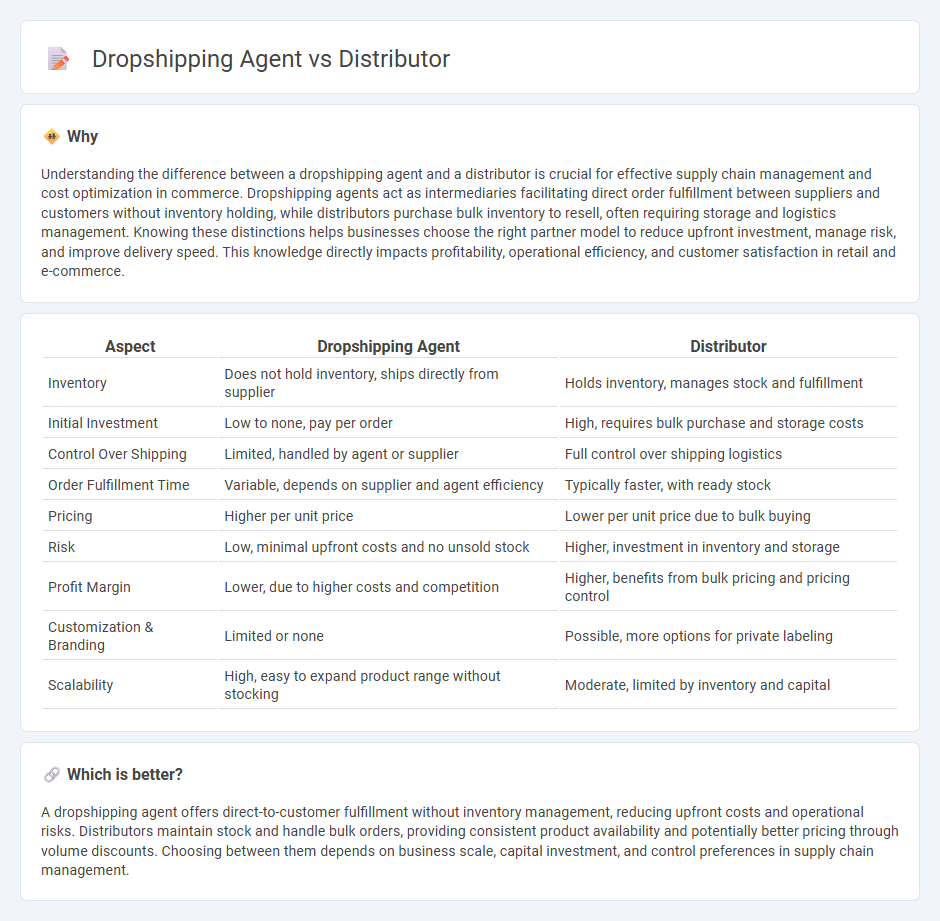
Dropshipping agents act as intermediaries who manage order fulfillment directly from suppliers to customers, minimizing inventory risks for retailers, while distributors purchase and stock products in bulk to supply retailers or resellers. Dropshipping agents offer flexibility and reduced overhead, whereas distributors provide faster shipping and greater control over inventory availability. Explore the key differences between dropshipping agents and distributors to optimize your e-commerce business strategy.
Why it is important
Understanding the difference between a dropshipping agent and a distributor is crucial for effective supply chain management and cost optimization in commerce. Dropshipping agents act as intermediaries facilitating direct order fulfillment between suppliers and customers without inventory holding, while distributors purchase bulk inventory to resell, often requiring storage and logistics management. Knowing these distinctions helps businesses choose the right partner model to reduce upfront investment, manage risk, and improve delivery speed. This knowledge directly impacts profitability, operational efficiency, and customer satisfaction in retail and e-commerce.
Comparison Table
| Aspect | Dropshipping Agent | Distributor |
|---|---|---|
| Inventory | Does not hold inventory, ships directly from supplier | Holds inventory, manages stock and fulfillment |
| Initial Investment | Low to none, pay per order | High, requires bulk purchase and storage costs |
| Control Over Shipping | Limited, handled by agent or supplier | Full control over shipping logistics |
| Order Fulfillment Time | Variable, depends on supplier and agent efficiency | Typically faster, with ready stock |
| Pricing | Higher per unit price | Lower per unit price due to bulk buying |
| Risk | Low, minimal upfront costs and no unsold stock | Higher, investment in inventory and storage |
| Profit Margin | Lower, due to higher costs and competition | Higher, benefits from bulk pricing and pricing control |
| Customization & Branding | Limited or none | Possible, more options for private labeling |
| Scalability | High, easy to expand product range without stocking | Moderate, limited by inventory and capital |
Which is better?
A dropshipping agent offers direct-to-customer fulfillment without inventory management, reducing upfront costs and operational risks. Distributors maintain stock and handle bulk orders, providing consistent product availability and potentially better pricing through volume discounts. Choosing between them depends on business scale, capital investment, and control preferences in supply chain management.
Connection
A dropshipping agent acts as the intermediary between the distributor and the retailer, handling product storage, packaging, and shipping directly to customers. Distributors supply products in bulk to these agents, enabling efficient inventory management and faster delivery times. This connection streamlines the supply chain, reducing overhead costs for retailers and expanding market reach for distributors.
Key Terms
Inventory Ownership
Distributors maintain full inventory ownership, purchasing products in bulk and storing them before selling to retailers or customers, which allows for better control over product quality and availability. Dropshipping agents, however, do not hold inventory; instead, they facilitate order processing directly from suppliers to customers, reducing upfront costs and storage responsibilities. Explore our detailed guide to understand the inventory management implications of choosing between a distributor and a dropshipping agent.
Fulfillment Process
Distributors manage inventory by purchasing bulk products, storing them in warehouses, and handling order fulfillment directly, ensuring faster delivery and quality control. Dropshipping agents, on the other hand, act as intermediaries who forward customer orders to manufacturers or suppliers, eliminating the need for inventory storage but often resulting in longer shipping times. Explore the differences in fulfillment strategies to optimize your supply chain efficiency.
Profit Margin
Distributors typically purchase products in bulk at wholesale prices, enabling higher profit margins by selling directly to retailers or consumers, while dropshipping agents facilitate order fulfillment without holding inventory, often resulting in lower margins due to added fees and reliance on supplier pricing. Profit margins with distributors can be more predictable and scalable given the control over stock and pricing, whereas dropshipping offers flexibility with reduced risk but slimmer margins because of third-party involvement. Explore how choosing between distributors and dropshipping agents impacts your profit optimization strategies.
Source and External Links
What role does a distributor play in the supply chain? - TechTarget - A distributor acts as an intermediary between a manufacturer and downstream entities such as retailers, bridging the gap in the supply chain by selling products and often adding services like logistics and inventory management to facilitate product movement.
What Is a Distributor? Distributor Definition & Meaning - A distributor purchases products from manufacturers or suppliers and resells them to retailers or end customers, playing a crucial role in facilitating product availability and often managing order fulfillment and logistics.
What is a Distributor? - Vencru - Distributors act as intermediaries who buy from manufacturers and sell to retailers or consumers, supporting market expansion, inventory storage, order fulfillment, and customer service to ensure products reach their intended markets.
 dowidth.com
dowidth.com